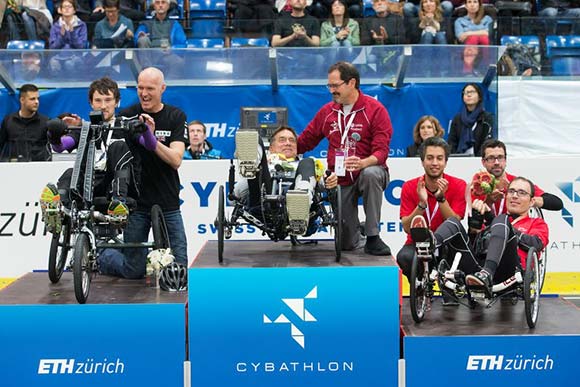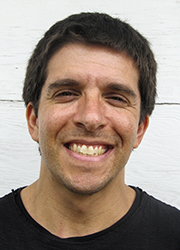Cleveland contingent wins gold, spreads awareness at inaugural Cybathalon
 Nicola PitaroCybathlon gold medal winner Mark Muhn (middle)
Nicola PitaroCybathlon gold medal winner Mark Muhn (middle)
A Cleveland-based group of researchers and athletes recently harnessed an innovative technology - along with a nearly superhuman will to win - to take home gold at the world's first "cyborg games."
The gold medal team journeyed to Zurich, Switzerland, in October to compete in the first ever Cybathlon, an international "cyborg Olympics" open to disabled people who use electronic prosthetics to compete daily tasks. Sent by the Louis Stokes Cleveland VA Medical Center, the contingent won a gold medal in the Functional Electrical Stimulation (FES) bike race, which modified recumbent bikes for competitors with spinal cord injuries.
Team Cleveland "pilot" Mark Muhn, a California native paralyzed from the armpits down after a skiing accident, finished 1:10 ahead of his nearest competitor, thanks to training and a locally-born experimental research program that implanted a pulse generator under his skin.
Designed by the Cleveland VA's Advanced Platform Technology (APT) Center, the device was connected to an external control box that Muhn and his fellow riders activated with a button press. The implant sent electrical stimulation to Muhn's paralyzed muscles, allowing him to create a pedaling movement in sync with the bike around a 750-meter track.
"The pulse generator is like a pacemaker that delivers current to the back, hips and legs," says Dr. Ron Triolo, team leader on the project. "That small amount of current fires the nerve, resulting in muscle contraction."
Cleveland's 10-person Cybathlon crew consisted of a biomedical engineer, a neuroscientist/certified bike mechanic and a world-class competitive cyclist. Triolo traveled to Zurich with Team Cleveland athletes bolstered by two months of training in the implant technology.
Winning the gold was exciting, but the Cybathlon's competitive aspect came in second to showing off an innovation that helps individuals with devastating spinal injuries regain some form of movement, Triolo says.
"We were using technology that's not commercially available and showing the potential difference these interventions can make in someone's life," he says. "We're raising awareness that hopefully sparks investment."
Combining sports and medical research was instructive for Triolo's team as well.
"Biking was new for us," he says. "It's a powerful exercise tool that made our volunteers stronger. They feel like they're part of society again."

